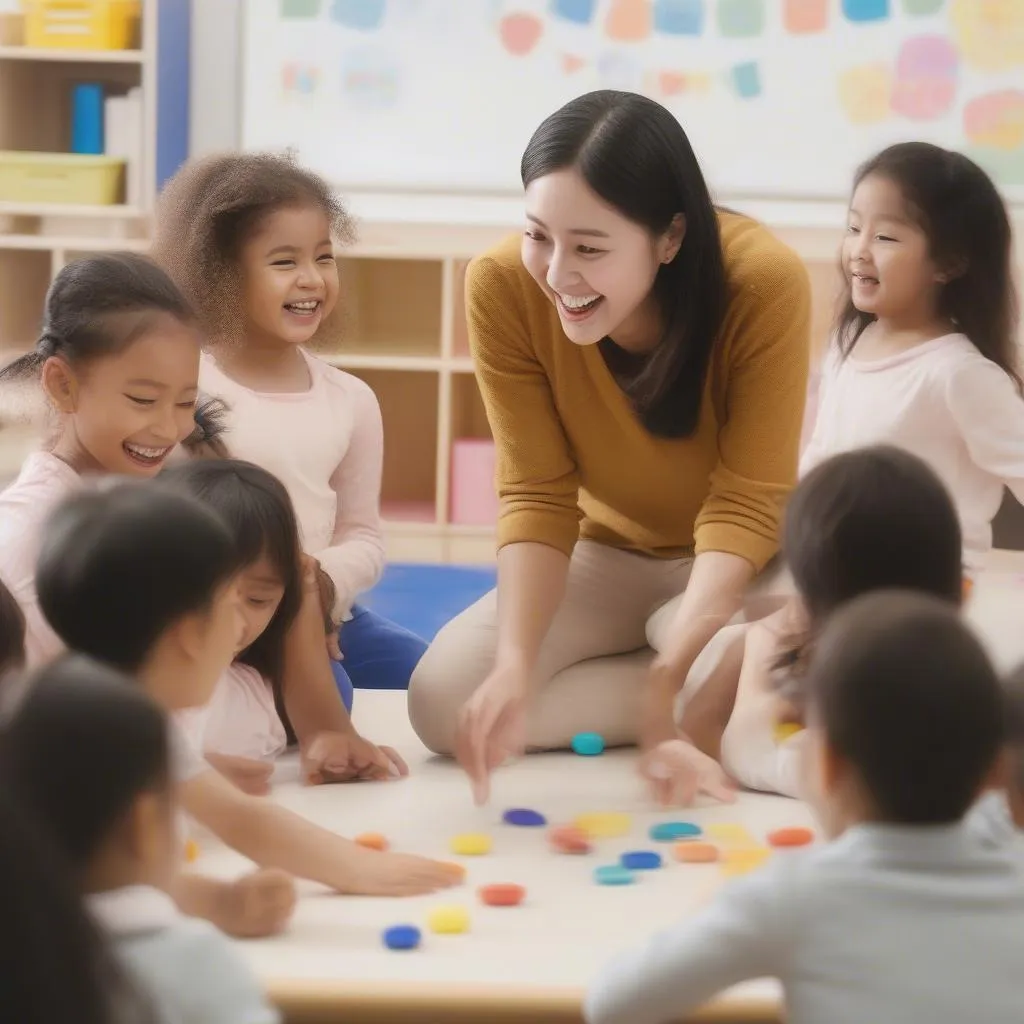Starting with the question: “How do we nurture young souls and build a solid foundation for future generations?” This question has become the motivation for many to choose the path of “cultivating people” – a path full of challenges but also immensely meaningful, filled with laughter and memorable moments. Early childhood education is the gateway to that journey, a journey full of joy and happiness.
Early Childhood Education: The Foundation for Holistic Development
Early childhood education is a field of study focused on researching and applying knowledge and skills to care for and educate children from 0 to 6 years old. This is a crucial period in every person’s life, when children are in the process of forming and developing comprehensively in terms of physical, intellectual, emotional, and social aspects.
Early childhood education is not just about teaching letters and numbers, but also an art of sowing seeds, cultivating beautiful seeds in children’s souls. Early childhood educators play an important role as guides, creating conditions for children to develop naturally and holistically, according to each child’s abilities and strengths.
Main Areas in Early Childhood Education
Early childhood education encompasses many key areas, each contributing to a complete early childhood education system:
- Childcare: Includes knowledge of nutrition, hygiene, health, and safety for children. Helps children develop healthy physical well-being and prevent diseases.
- Child Education: Includes knowledge of child psychology, teaching methods suitable for each age group, helping children develop intellect, language, social skills, creativity, etc.
- Early Childhood Education Management: Includes knowledge of classroom management, preschool management, educational planning, evaluating children’s learning outcomes, etc.
Why Choose Early Childhood Education?
Choosing early childhood education is a meaningful and challenging decision because:
- Meaningful Career: Being an early childhood educator is a noble profession, bringing joy and happiness to children, contributing to building future generations.
- Dynamic Work Environment: The work environment in early childhood education is filled with laughter and the innocent, naive nature of children, creating inspiration and optimism for teachers.
- Career Development Opportunities: The early childhood education sector is growing, opening up many attractive career opportunities for early childhood educators.
Frequently Asked Questions About Early Childhood Education
- What skills are needed to study early childhood education?
Education expert Le Minh Phuong – author of the book “Early Childhood Education – Key to the Future” shares: “Early childhood educators need to have basic skills such as:
- Communication Skills: Communicating effectively with children, parents, and colleagues.
- Pedagogical Skills: Skills in organizing classrooms, planning lessons, and conveying knowledge effectively.
- Observation and Assessment Skills: Observing and assessing children’s development, thereby providing appropriate educational methods.
- Problem-Solving Skills: Handling situations that arise during teaching and childcare.
- Artistic Skills: Using artistic methods and techniques to create learning interest for children.
- Where can I study early childhood education?
You can study early childhood education at universities and pedagogical colleges nationwide.
- What is the job of an early childhood educator?
The job of an early childhood educator includes:
- Caring for and nurturing children: Taking care of children’s health, hygiene, and safety.
- Teaching children: Teaching children basic knowledge of language, mathematics, science, art, etc.
- Organizing fun and recreational activities for children: Creating a healthy play and learning environment, developing children’s abilities and potentials.
- How to become a good early childhood educator?
To become a good early childhood educator, you need:
- Love for Children: Love children, give them care, attention, and dedicated education.
- Solid Professional Knowledge: Master knowledge of childcare and education, especially knowledge appropriate for the age group you teach.
- Continuous Learning and Self-Improvement: Constantly learn and update new knowledge and skills to improve professional qualifications.
- Positive and Proactive Attitude: Always maintain an optimistic and cheerful spirit, creating motivation for children.
- How to find a job after graduating from early childhood education?
You can find jobs at public and private preschools, or early childhood education centers. You can also open your own preschool.
The Spiritual Beauty in Early Childhood Education
According to Vietnamese spiritual beliefs, children are “little angels” with pure and innocent souls. Therefore, the work of caring for and educating children is a very sacred task, which must be carried out with love, patience, and high responsibility.
There is an old saying “What you sow, you shall reap,” early childhood educators are the ones who sow seeds for future generations. A loving heart, dedication, and solid professional skills will help teachers sow good seeds for the young generation, contributing to building a better society.
Conclusion
Early childhood education is a meaningful field of study, offering an opportunity for you to realize your dream of “cultivating people,” contributing to nurturing the future sprouts of the country. If you love children, love teaching, and are passionate about education, choose early childhood education to join us in creating healthy, talented, and happy future generations!
Leave a comment or contact us via phone number: 0372999999 for detailed advice on this major!
